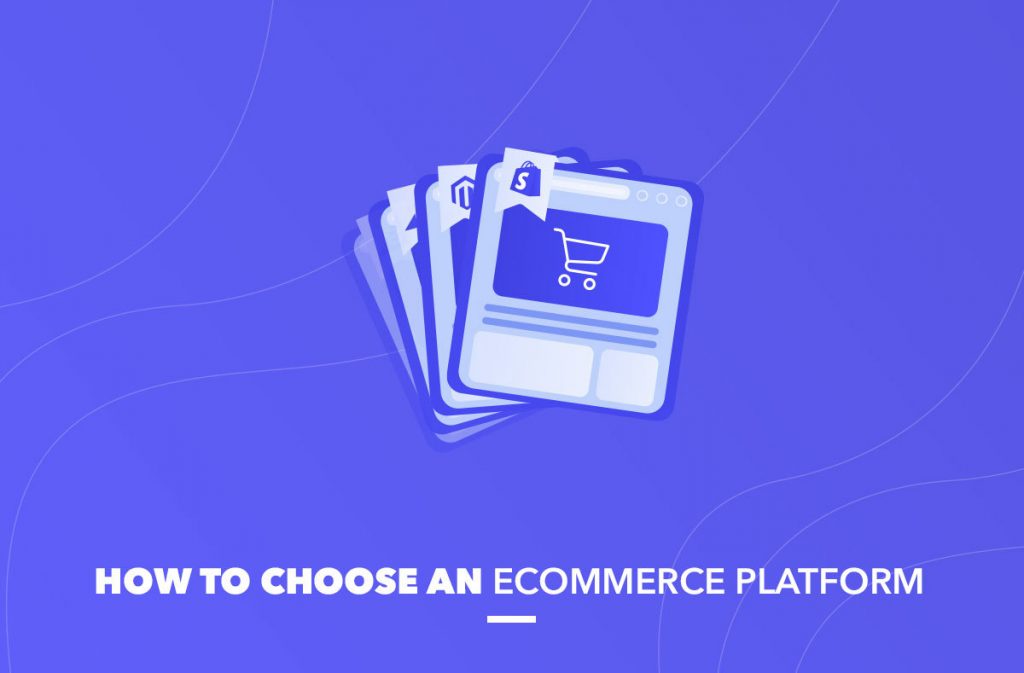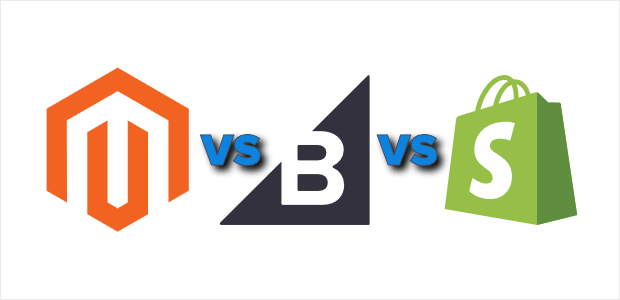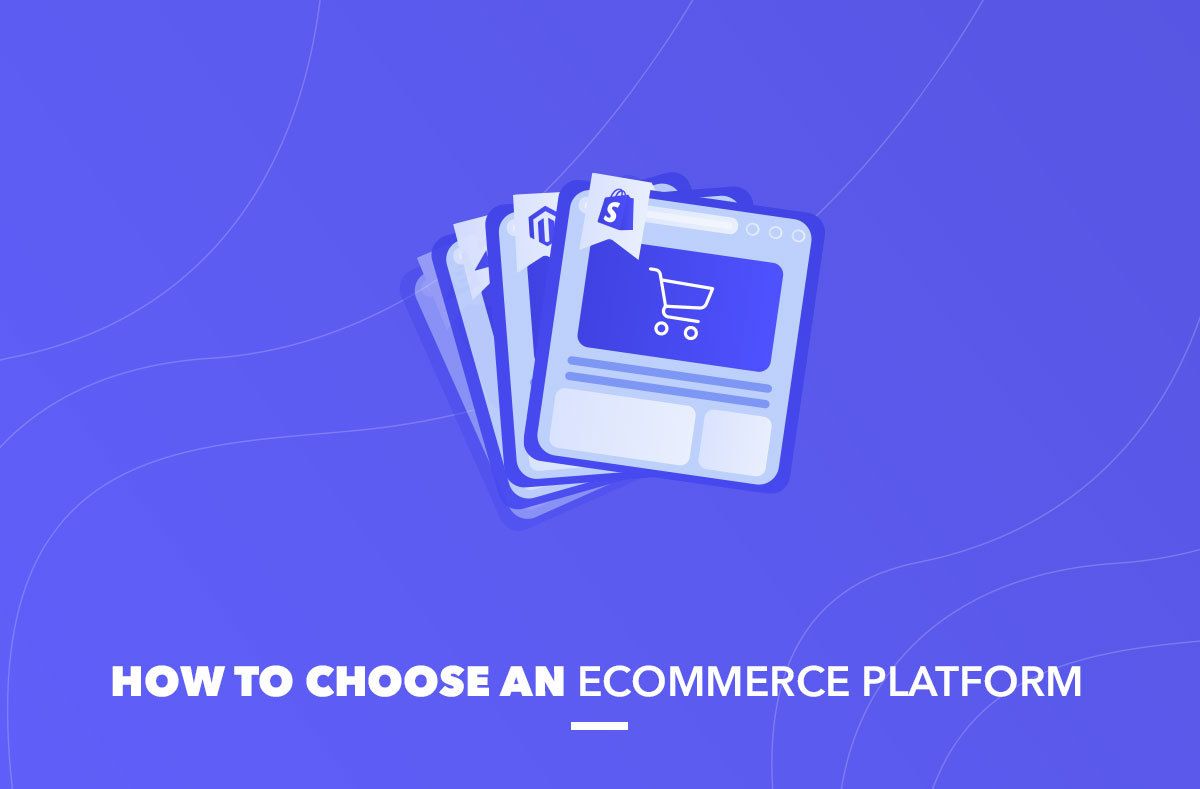
It has never been easier to sell anything online. With the introduction of e-commerce 10 years ago, online sellers have been able to reach a whole new audience. If you are new to the business world and want to take part in this booming market, it's a good idea to familiarize yourself with e-commerce.
This article will provide you with some information on the growth of e-commerce and help you with choosing an e-commerce platform. We have also prepared a detailed comparison of the main e-commerce platforms: Magento, Shopify, and BigCommerce.
E-commerce Market Overview
The e-commerce market is one of the fastest-growing industries around the world. At the beginning of 2022, e-commerce sales reached $5.424 billion. By 2024, the experts expect the e-commerce market to hit the $6.3 billion mark.
In fact, the demand for flexible, simple, and convenient buying has increased exponentially over the past few years, with the first online stores appearing in the mid-90s. Introducing of online buying platforms has made it possible for companies to close brick-and-mortar locations for more cost-effective online entities.
The demand for online shopping has been rising, which means that the market for e-commerce statistics is growing tremendously.
Here are some more e-commerce market statistics:
- By 2040, 95% of sales will happen online.
The most common purchases are electronics and digital media, like music downloads, e-books, and video games. About 1\3 of customers buy their clothes and footwear online, and 48% buy groceries via the internet as well.
- Credit card is the most preferred payment method
Credit cards handle about 53% of transactions, debit ones — 48% and 38% are allocated for digital payment systems.
- 2.14 billion people are shopping online in 2021
In 2021, the number of online shoppers reached 2.14 billion, which is about 25% of the global population.
- There are about 12-24 million e-commerce websites
Although the competition might seem tough, less than 1 million websites make yearly revenue of more than $1000.
- 59% of millennials first try to purchase the item from Amazon
Amazon is your greater competitor since 59% of customers start their shopping journey by searching for the necessary item there.
- 61% of clients make their purchase decision based on recommendations from a blog
This is a good reason to start building relationships with the customers with the help of content marketing. Creating content is also a good way to increase your positions in the search engine.
Key criteria for choosing an e-commerce platform
To make the right decision, you need to define your business needs and to analyze the offers of the e-commerce platforms. Here are the main criteria to consider.
1. Pricing & functionality
Platforms will generally come with a monthly fee, with some platforms having a very low fee. Other platforms may have a slightly higher fee, but they will offer more functionality, including custom fields, customizable templates, and more.
You should also consider the processing fees associated with the platform. They are charged per order and typically range from $0.25 to $0.75. The processing fees can be set as a percentage of the total sale price and are not limited to a specific plan.
2. Integrations
Integrations are a huge factor you should consider when selecting the e-commerce platform that is right for your business. With so many e-commerce platforms out there, you want to make sure that you can integrate your business with other services such as your CRM, email marketing, and payment gateways.
3. SEO-friendliness
When you’re choosing an e-commerce platform, you need to think about SEO. For example, if you’re trying to sell a product, you want to make sure you can rank for the keywords that are related to that product. You need to make sure the platform does not penalize you for using certain keywords and that it is easy for you to rank for the relevant keywords.
4. Mobile-friendliness
It’s important to create a mobile-friendly website. A lot of people search for products on their phones and are more willing to buy from a mobile device. If you want to ensure that your customers can easily purchase from your website, you’ll need to make sure your website is mobile-friendly.
What does that mean? It means that your website is responsive and easy to use on a mobile device. If your website isn’t optimized for mobile devices, customers will be forced to use a computer or to go to your competitors with mobile-friendly websites.
5. Customer service
When choosing e-commerce platforms, it is important to consider the customer service that is offered. This is an essential factor in selecting any e-commerce platform. It is important to provide your customers with assistance when they need it and to be available when they contact you.
6. Security
Security is a major issue for online shoppers, as cybercriminals are becoming more and more sophisticated. To ensure that your customers shop safely, you need to make sure that your e-commerce platform is secure.
PCI compliance is important for this, as it ensures that the platform is safe for your customers. HTTPS/SSL is an additional security measure, as it ensures that the data is encrypted so that it can't be intercepted. It also helps to prevent phishing and man-in-the-middle attacks.
In addition, the platform must be safe for your customers. You need to make sure that it doesn't have any known security issues and that it is covered by a security guarantee. Finally, you'll need to have a process in place to respond to security breaches and to ensure that your customers are not adversely affected.
7. Scalability
As your business grows, and you need a platform that will grow with you, you want to make sure that your e-commerce platform can scale to meet your needs. You want to make sure that you’re not paying for features and storage that you’re not using.
It’s important to look at the options you have when it comes to scalability. There are different ways you can scale your e-commerce platform, but the most common ways are through the use of APIs or the use of a cloud platform.

Best E-commerce Platforms Comparison
Both new businesses and enterprises willing to scale their businesses need to choose the right e-commerce platform for their needs. For you, we have made a comparison of the three biggest e-commerce platforms: Magento, Shopify, and BigCommerce.
|
Magento |
Shopify |
BigCommerce |
|
|
Pricing |
Open-source edition — free Enterprise edition — $22000-125000 \ year |
Basic — $29 \ month Advanced — $79-299 \ month Enterprise — $2000 \ month |
Basic — $29 \ month Advanced — $79-299 \ month Enterprise — custom |
|
Usability |
Highly complex with advanced customization options |
Intuitive, no coding skills required |
Intuitive, no coding skills required |
|
Theme selection |
No built-in themes, need to buy or create |
Free and premium themes that can be customized |
Free and premium themes. Some can be customized, some can’t. |
|
Hosting options |
Doesn’t provide hosting, supports on-premise, cloud, third-party one Cloud hosting — for Enterprise clients |
On-premise, cloud, third-party one Provides cloud hosting for all clients |
On-premise, cloud, third-party one Provides cloud hosting for all clients |
1. Pricing
When deciding on a platform for your e-commerce business, it is important to consider how much you're willing to invest in your business, as well as how much you're willing to spend on ongoing costs. To do this, it's important to assess the initial and ongoing costs of the platform. When it comes to the initial costs, some platforms offer a free plan or a low-cost option.
Magento
You can download Magento open-source version for free, but you will have to spend costs on design, development, hosting, security measures, etc. Additionally, a free Magento product doesn’t have any support.
If you choose Magento Enterprise edition, you will have to pay from $22000 to $125000 for an annual license.
Shopify
This platform has several pricing options and the cheapest one starts at $29 per month. Some advanced plans range from $79-$299. There is also Shopify Plus edition designed for enterprises that cost about $2000 per month.
Pay attention that Shopify plans may lack some basic features, and you will have to install the additional applications that will make the cost of ownership more expensive
BigCommerce
BigCommerce basic plan starts at $29 per month, the more advanced ones — $79-299 per month. There is also an Enterprise plan available, but its cost is calculated individually based on the customer’s needs.
2. Usability
The ease of use of e-commerce platforms is important. E-commerce platforms are not difficult to use, but when you are looking for an e-commerce platform for your business, you should ensure that it is easy for your team to use. A platform should be easy to ramp up and get used to, as well as intuitive. It should be easy for your team to understand and use the features of the platform, and it should also provide the tools needed to effectively run your business.
Magento
Magento provides a fully customizable infrastructure but doesn’t have any ready-made templates or tools. Choosing Magento, a business needs to have a developer to build a site, a hosting provider, a tech specialist for integrations.
Shopify
Shopify makes it easy to build a site. You can design your site in the web builder or via the admin interface. It's a hosted solution where you don't have to install anything. Using Shopify, you can also have additional extensions that allow you to include your custom code. It's a platform that is easy to use and has a user-friendly design.
It has a drag-and-drop interface making it relatively easy to build a website on your own.
BigCommerce
BigCommerce is a platform that allows you to create an e-commerce website. It has a clean user experience that makes it easy to build beautiful websites even if you have never done it before. BigCommerce also offers a simple shop page for adding products and managing orders. This makes it easy for you to get your e-commerce site up and running fast.
This is a great option for anyone who wants to get started with e-commerce and doesn't need to spend hours learning the ins and outs of coding.
3. Theme selection
When it comes to your e-commerce site, the visual elements are the very first thing your customers will see. Make sure the first impression is a positive one by choosing the right theme for your site. Searching for the right theme will depend on the brand that your business is trying to create.
Selecting the right theme will depend on your business goals, the type of products you sell, and the demographics of your customer base.
Magento
The native software that comes with Magento is minimalistic. It includes the necessary features for running a website but does not offer any themes as part of the product. Instead, businesses must find and purchase their ones from third-party sites like ThemeForest or pay a developer to build one.
Shopify
It offers a variety of themes that can be free or available for purchase. They are optimized for mobile devices and can be customized in the way you want.
BigCommerce
BigCommerce has a wide assortment of different themes available, some of which are free and some of which are premium. Some themes are fully customizable, and some are not.
4. Hosting options
E-commerce platforms are available in both on-premise and cloud-based options. However, there are some significant differences between these options that should be considered. Cloud-based e-commerce platforms are usually more affordable, which is why they are more commonly used by smaller businesses.
They also provide a larger selection of features, such as hosting multiple websites, automatic updates, and built-in marketing tools. On the other hand, on-premise software is typically more reliable, providing more features and security features, such as hosting data in a locked-down environment. However, they come with a greater cost.
Magento
Magento offers on-premise, cloud, and third-party hosting installation, depending on what you are going to do with the platform. Generally, Magento customers are responsible for finding a hosting provider on their own, but if you choose an Enterprise subscription, Magento offers its cloud hosting.
Shopify
Shopify offers several hosting options - Standard, Plus, and Premier. Standard hosting is completely cloud-based and hosting is included with your subscription to them. That means you won’t have to hunt for third-party hosting and deal with the challenges of managing it.
Plus hosting is similar, but with unique features like built-in app integrations for third-party apps like Instagram and Mailchimp. Premier hosting is for power users and high-traffic websites, and it allows for more customization with features like SSL encryption, a MySQL database, and a custom domain.
BigCommerce
BigCommerce is a totally cloud-based e-commerce platform that allows you to create and sell your products with a quality experience. It's a favorite among entrepreneurs, small business owners, and even some of the world's biggest brands. BigCommerce offers a lot of features, many of which are hosted on the cloud so that you're not stuck with your own hosting. If you're looking for best-in-class performance and hosting, check out BigCommerce.
Conclusion
We hope you enjoyed our article on how to choose an e-commerce platform. We know that it can be hard to find a platform for your e-commerce site, so if you are struggling with this decision, we hope that our article helps you in your decision-making process. If you have any further questions you can request a quote. Thank you for reading, we hope to hear from you soon!



